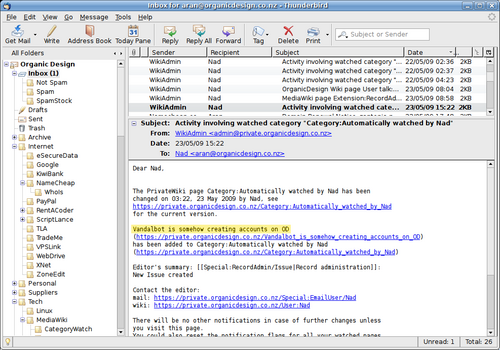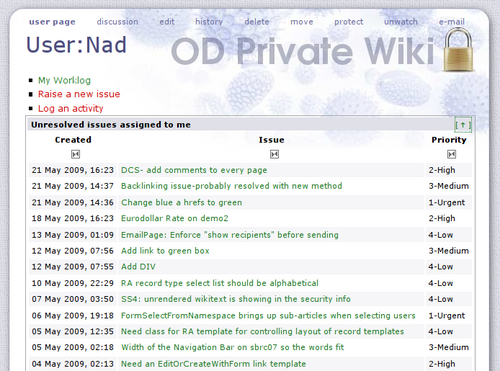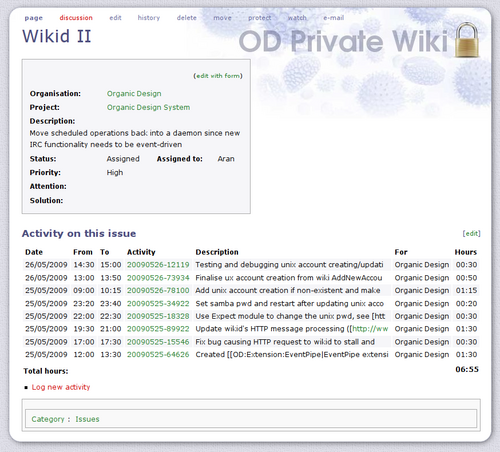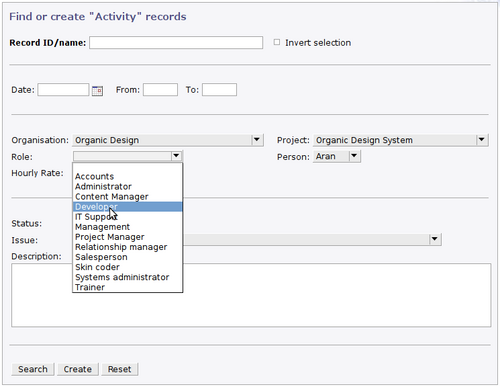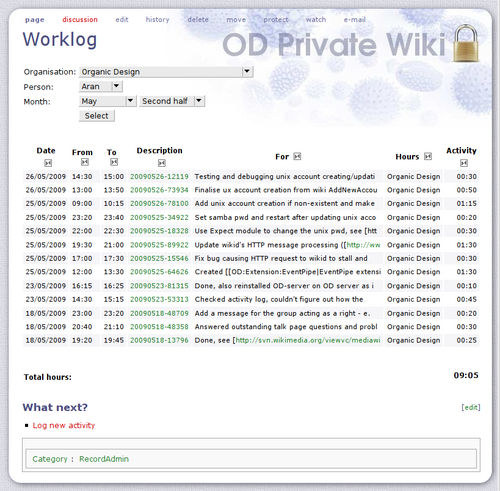Difference between revisions of "Issue"
(example sequence of activity) |
(→Example sequence of activity) |
||
| Line 18: | Line 18: | ||
[[Image:Issue.png|500px]] | [[Image:Issue.png|500px]] | ||
| + | |||
| + | After some work has been carried out on the issue, an activity record can be created to account for the time. Depending on the context the activity is created within various fields may already be filled out. For example, clicking on the red link in the above picture results in the following activity form which already has the Organisation, Project and Person fields populated. | ||
| + | |||
| + | [[Image:Activity.png|500px]] | ||
Activities can be carried out in this manner and can eventually be compiled into a worklog for invoicing particular organisations for specified periods of work as shown in the following picture. | Activities can be carried out in this manner and can eventually be compiled into a worklog for invoicing particular organisations for specified periods of work as shown in the following picture. | ||
[[Image:Worklog.png|500px]] | [[Image:Worklog.png|500px]] | ||
| − | |||
== Fields in an Issue record == | == Fields in an Issue record == | ||
Revision as of 04:19, 26 May 2009
An Issue is a problem or requirement of work needing to be done. Usually it is related to a particular project and organisation. Issues are resolved by roles performing activities on them. See the raise an issue procedure for help on how to use issues.
Example sequence of activity
First users may arrive at an Issue record by via their email since they will likely be watching various work categories. The image below shows a typical email received in this way, the highlighted area is the Issue name and serves as a short description (click on the image for a clearer view).
Alternatively issues relating to a user are available from their user page or other specific portals in the wiki. This image shows a typical wiki organisation user page with a number of prioritised outstanding issues.
After selecting an issue to begin doing some work on, the user can see all the relevant information on the issues current state at the top, then below that is a list of activities which have already been performed on this issue, including a red link allowing the creation of a new activity for this issue after the current work session is done.
Apart from these things at the top, the record is a normal article and can have arbitrary related content appended by editing as usual, all the normal discussion and history options are available for proceeding with normal collaboration.
After some work has been carried out on the issue, an activity record can be created to account for the time. Depending on the context the activity is created within various fields may already be filled out. For example, clicking on the red link in the above picture results in the following activity form which already has the Organisation, Project and Person fields populated.
Activities can be carried out in this manner and can eventually be compiled into a worklog for invoicing particular organisations for specified periods of work as shown in the following picture.
Fields in an Issue record
ID: Issues use common-sense short descriptions for their identities
Project:
Organisation:
Description:
Status:
Priority: Accepts values from "1-Urgent" to "4-Low". The leading number allows table columns that contain this field to be sortable.
AssignedTo:
Attention: The value of this field is of type Person and should be set to the person who the issue requires attention from before it can continue.
Solution: A description of the solution if the issue has been resolved. This should include links to diff's, resources or discussion carried out during its solution. Note that the issues lists in users pages and roles portals will not consider an issue resolved if the Solution field is empty.
